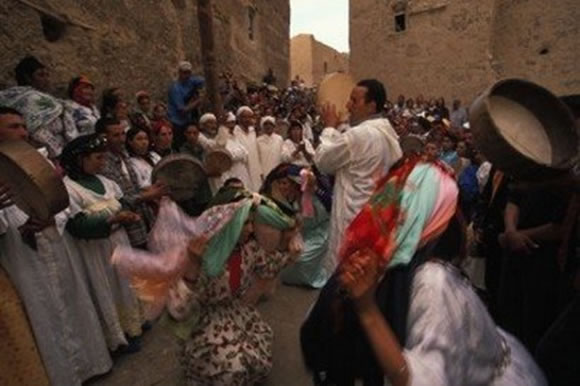Isgar or mass marriage season - Taznakht Kasbah customs and traditions

The Amazighs of Morocco are working to preserve the symbolic cultural heritage in a large way, and thus many of the ancient phenomena and customs, striking in the depth of time, did not disappear, and even in light of the development of the path of Arab Amazigh détente, especially with the constitution of the Amazigh language and considering it an official language alongside Arabic in Morocco, and a stock In common for all Moroccans, many Moroccan tribes worked to revive rituals and practices that had disappeared due to their involvement in modern life. What is group marriage ...
and group marriage in Taznakht Kasbah is a very old heritage. The residents of Taznakht Kasbah celebrate each year the Iscar season. And Iskar is a singular plural and the plural of supplies, tiskar and singular as supplies, scart, which is a piece of fabric, and as it is called in Amazigh, tamanat, and Iscar also came from a verb, sugar, meaning throwing stones or pebbles, which is what we find in this season when the static stone the devil.
Yes, as I said earlier, this season is somewhat similar to the Ahal season, which we find among the Amazigh Tuareg.
And the people we have is litehal, which means wedding or marriage, and it is usually said to us, “Yes you qualified”, that is, did you get married as we find this type of group marriage in a castle formed in Ouarzazate, which is called the rose season, and we are called the Iscar season.
During my modest research, I was able to collect about 99 types of Iscar in the southeast. But all of these types differ from one region to another.
The Iskar season begins every year ten days after Eid al-Adha. It is customary and popular belief that we do not travel during this period until this season passes and according to this prevailing belief, whoever travels will be cursed.
Yes, on this very day, an old woman collects flour and cordas, tactsin in the village and in the neighboring villages, kneading a strange dough, for dressing, and distributing it in various water springs, according to popular belief. The winds are abundant on this day. After that, a group of young men and women who are willing to marry take a large procession, and the drums are beating, and they sing old Berber poems, which are lyrical poems par excellence.
Like
.. Iscar eg ran the money of
Klinas Townza
or
Estes n Sidi Muhammed
Atashrifini
Estes n Sidi
Namer Atalkarshini
and so
on. After that, they stone the devil in the village of Edoud in Taznakht.
The devil is nothing but that strange man who comes to the village and wants to strike these customs to the core. As for salvation from this devil, he is stoned.
And when this procession returns directly, every one of the village’s youth comes with his mule or horse and races. My father comes in the front, he will be the leader of the tribe and its knight. At dinner, families in this village give a luxurious banquet with Eid al-Adha meat on such an occasion.
The old legend says that the reason for the existence of this party goes back to an old leader in the village. After he saw that the village had many maidens, this leader thought of a trick, so he summoned the most famous poets of the village, where everyone praised the village girls, and not a day passed on that until all the young women of the village got married.
Note. This season is still held every year in the village of Taznakht Kasbah in the province of Ouarzazate
. This collective marriage began to gradually disappear, especially after it was subjected to a coordinated attack by the puritan jurists
This topic was previously published in both Tawiza newspaper, and Tamazight.

Researcher: Alhassan aaba
-Isgar note is a ritual of collective marriage that prevailed every year in Taznakht Kasbah and Douar Aradg
Source: websites

